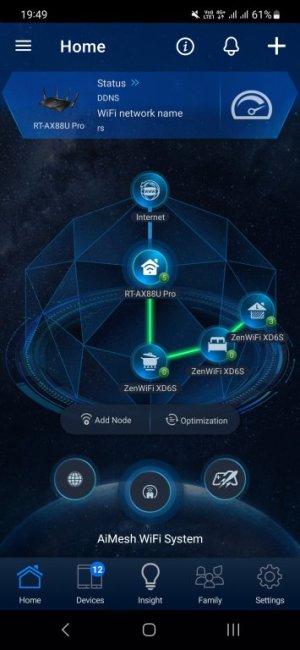Hello,
I have Asus RT-AX88U Pro and I set up port forwarding to PC/linux machine (wired connection directly to RT-AX88U Pro, added a rule in DHCP that this computer has to have the same IP every time 192.168.50.236; Port forwarding details: external port: 1980, internal port: 1980; service running on this linux machine is ssh on this port). Everthing worked fine. Then I saw there wasn't enough wifi coverage in the house => I added 3 AiMesh nodes (3x ZenWifi XD6S, all connected wirelessly) to extend the wifi coverage. Wifi coverage is fine now. But out of the blue I found out I cannot connect to the linux machine from public internet. I digged a lot and tried everything, but no luck. I decided to reset RT-AX88U Pro to factory default.
After the reset (and some very basic setting, including the very same port forwarding I had before) connection to the linux machine worked! Voila!
So I added feature by feature and everytime tried to connect to linux machine from public internet:
Any idea? I'm at the end of my tether.
I'm at the latest versions of the firmware (all RT-AX88U Pro and AiMesh Nodes):
RT-AX88U Pro: 3.0.0.6.102_33308-gfb75e0b_344-g69f33
3x ZenWifi XD6S: 3.0.0.4.388_23773-gad68d0f
Attaching AiMesh configuration picture.
I have Asus RT-AX88U Pro and I set up port forwarding to PC/linux machine (wired connection directly to RT-AX88U Pro, added a rule in DHCP that this computer has to have the same IP every time 192.168.50.236; Port forwarding details: external port: 1980, internal port: 1980; service running on this linux machine is ssh on this port). Everthing worked fine. Then I saw there wasn't enough wifi coverage in the house => I added 3 AiMesh nodes (3x ZenWifi XD6S, all connected wirelessly) to extend the wifi coverage. Wifi coverage is fine now. But out of the blue I found out I cannot connect to the linux machine from public internet. I digged a lot and tried everything, but no luck. I decided to reset RT-AX88U Pro to factory default.
After the reset (and some very basic setting, including the very same port forwarding I had before) connection to the linux machine worked! Voila!
So I added feature by feature and everytime tried to connect to linux machine from public internet:
- It worked after I created Guest network
- It still worked after I set QoS (Bandwidth limit for some of the devices on the network)
- It still worked after I added first AiMesh node
- But!... once I added second AiMesh node, it stopped working. I tried adding the last (third) AiMesh node, and obviously, still not working. So I removed the 2nd and 3rd AiMesh nodes and... port forwarding was working again. What's going on?!
Any idea? I'm at the end of my tether.
I'm at the latest versions of the firmware (all RT-AX88U Pro and AiMesh Nodes):
RT-AX88U Pro: 3.0.0.6.102_33308-gfb75e0b_344-g69f33
3x ZenWifi XD6S: 3.0.0.4.388_23773-gad68d0f
Attaching AiMesh configuration picture.
Attachments
Last edited:

